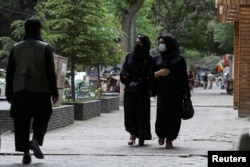India has reestablished a diplomatic presence in Afghanistan by sending a technical team to reopen its Kabul embassy, ostensibly for humanitarian purposes, but analysts see it as an effort to secure New Delhi’s strategic interests in the conflict-ridden country, where the Taliban’s return has put Pakistan in a dominant position.
India closed its embassy after the Taliban takeover last August in what was seen as a major strategic setback for New Delhi.
The Ministry of External Affairs said the team is to coordinate the delivery of humanitarian assistance but analysts cite other reasons for the move.
“Reopening the Indian Embassy is really about keeping our eyes and ears on the ground and exploring the possibility of a working relationship with the Taliban, which includes security assurances that Afghan territory would not be used, particularly by Pakistan against India,” Gautam Mukhopadhaya, a former Indian ambassador to Afghanistan, said.
“It’s an opening gambit so to speak, in some ways you are back in the game,” he said.
India has been concerned that Afghanistan will become a haven for militants from Pakistan who have been at the forefront of a three-decade violent separatist insurgency in Indian Kashmir.
India and the Taliban have long been fiercely opposed to each other, but both sides have shifted their stance slightly. Analysts say that while New Delhi has accepted that the hardline Islamist group is there to stay for the foreseeable future, Afghanistan’s new leadership has also reached out to India.
“The Taliban has sent signals that it would like India to be present because they are trying to engage with the rest of the world and India is an important country in the region. From the Indian point of view, if the possibility emerged of keeping a presence in Afghanistan, then why not?” said Sushant Sareen, a senior fellow at the Observer Research Foundation in New Delhi.
“However, this is in no way an endorsement of the Taliban regime. India has only gone back in a small way,” he added.
India has consistently called for an inclusive administration in Afghanistan and expressed concern at the erosion of women’s and girls’ rights under Taliban rule.
The first signal of rapprochement between the two sides came when India began sending food and medicine to the country earlier this year. So far it has sent 20,000 tons of wheat. It also sent aid in the aftermath of the deadly earthquake that wracked Afghanistan last month, along with the technical team posted to Kabul.
After India reopened its embassy, Afghanistan called on other countries to do the same thing.
“The arrival of Indian diplomats in Afghanistan and reopening of [Indian] embassy demonstrates that security is established in the country and all political and diplomatic rights are respected," Abdul Qahar Balkhi, Taliban spokesperson said.
The next step could be to facilitate student and medical visas for Afghans wanting to come to India. Hundreds of students, including many who were given scholarships by the Indian government, were enrolled in Indian universities before the Taliban takeover but many had returned to Afghanistan during the COVID-19 pandemic, as colleges switched to online learning. India was also a popular destination for Afghans seeking medical treatment.
After a meeting between Taliban foreign minister, Amir Khan Muttaqi, and Afghan students this week, the Taliban said that Kabul will approach New Delhi to grant visas to students who have not been able to return to India after COVID restrictions were lifted.
“The premise on which India has gone back to Afghanistan is for the welfare of the people. If that is so, then giving student and medical visas are likely to be on the table although it may not happen in the near future,” Sareen said.
“India will first wait and watch whether the Taliban is willing to do business with us,” he said.
The Taliban outreach to India is also seen as helping the group as Afghanistan faces huge challenges.
“The Taliban better positions itself to make pitches for badly needed financial assistance from a major source of aid – even though New Delhi likely won’t make commitments to anything beyond humanitarian aid,” said Michael Kugelman, deputy director of the Asia Program at the Washington-based Wilson Center. “And it can help the Taliban earn some backing from a public that has resented the Taliban's historic deep ties to Pakistan,” he said.
However, India’s engagement with the Taliban is likely to be a slow, cautious process as it assesses the group’s attitude toward New Delhi.
“It is unlikely India will upgrade the embassy anytime soon or maybe at all, depending on the direction that the Taliban takes. You are treading water but with your foot in,” Mukhopadhaya said.
From the standpoint of India’s Western allies, such as the United States, New Delhi’s return to Afghanistan is a welcome development according to analysts.
“It’s important for Washington that it’s not just rivals like Pakistan, China, Russia, and Iran that are engaging with the Taliban,” according to Kugelman. “The US will also likely view India as an important player in its efforts to get the Taliban to improve its rights record.”
The embassy reopening could also be a step toward New Delhi, which some had thought sidelined in the region in August, regaining some of the leverage that it has lost in the country, where for two decades following the 2001 U.S. invasion it had built soft power with a slew of development projects such as roads, schools and hospitals.
“In Afghanistan, there is never any endgame,” Sareen said, “Every endgame is the beginning of a new Great Game.”






